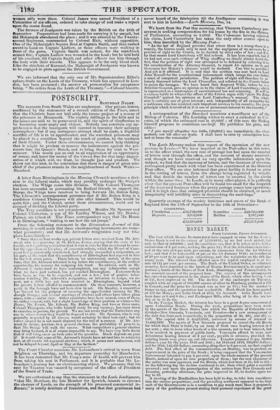We learn from the Post this morning, that Viscount Canterbury
per- severes in seeking compensation for his losses by the fire in the Houses of Parliament, amounting to 6,000/. The Commons having rejected his claim, Lord Canterbury has taken the only other course open to him, thus described by the Morning Post- " As the law of England provides that where there is a wrong there is a remedy, the Crown could only be sued for the negligence of its servants by a petition of right to the Crown, to be decided by strict rules of law; and it is by that means Lord Canterbury will find redress. It has been reported, but if we had not seen such evidence of 'Whig shuffling we should almost doubt the fact, that the petition of right was attempted to be defeated by referring it to the consideration of the Attorney-General, to report his opinion on it, and thereupon her Majesty's pleasure would be declared. Can this be possible? And yet is it affirmed. It is said that the petition was sent back to Lord John Russell for the constitutional indorsement which brings the ease before a court of competent jurisdiction. The petition of right will therefore be so lemnly discussed before the Lord Chancellor, and referred to the Courts below to assess the damages. We have heard that Sergeant Wilde, before lie urns Solicitor-General, gave an opinion as to the claims of Lord Canterbury, which is represented as a masterpiece of constitutional law and reasonings. It will be a curious battle to witness the officer of the Crown argue with plain Sir Join Campbell' against his opinions as Lord Canterbury's counsel. The whole case is certainly one of great interest ; and, independently of all sympathy for it nobleman who has rendered such important services to his country, the great principle which is involved in it is one of paramount interest to the country."


























 Previous page
Previous page